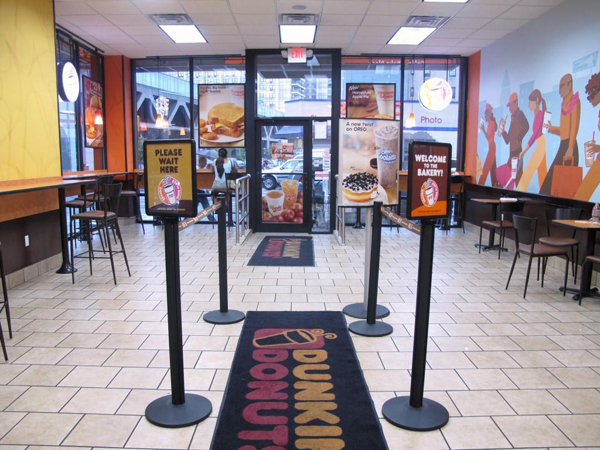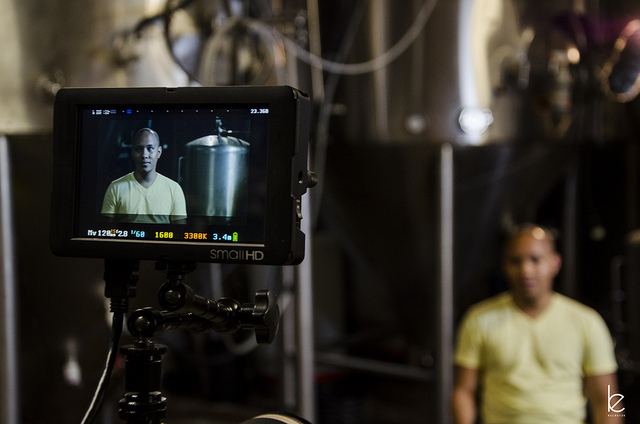Story & photos by Angela Bao Bei Bei (@AngelaBaoBeiBei)

A de facto flagship store opened in the same neighborhood of Nick Domo’s store, featuring spacious design, high ceiling and bright French doors.
Already boasting more than 7,000 stores across the country, Dunkin’ Donuts is seeking to double its footprint by 2020, an expansion plan first mentioned in 2006 following the company’s leveraged buyout.
For residents of Washington Heights, the growing presence of the pink and orange logo is felt by simply walking on the street rather than heard from news.
Within one mile of the 181st Street subway station of the 1 train, there are seven Dunkin’ Donuts franchises. The latest one, at 1,800 square feet with seats and long tables to accommodate dozens of customers, opened at the intersection of 178th Street and Broadway just one year and a half ago.
While this expansion might be a healthy sign of the parent company’s booming business, for Nick Domo, who runs one of the smaller franchises in the neighborhood, the newest store is the final straw.
Domo, who has been managing the store on 181st Street near Bennett Avenue since 2002, has always faced the challenge of both spiking rent – which has risen more than 60 percent over the past 10 years – and competition from local bodega who sell coffee at one third the price of his. Now he had a third and even bigger problem: competition from his own parent company, which he says has further saddled his bottom line by grabbing 20 percent of previous sales.
Domo said he will sell the franchise if anyone is willing to buy.
“It’s a 24-hour headache to manage this place now,” said Domo. “How can I survive? You open a store so close to me. Sales of everything is less now.”

A Dunkin’ Donuts store on 181st Street, between Bennett Avenue and Magaw Place, is on the verge of being driven out of business after a larger same-brand store opened three blocks way.
The franchise’s top line, he said, has dropped $2,000 on a weekly basis since the behemoth neighbor took their foothold three blocks away. Net profit margin has shrunk to six to seven percent, Domo added, almost half the level of a typical store.
As for royalty and advertising fees, each franchise pays a percentage of its sales every month to Dunkin’ Brands, the parent company of Dunkin’ Donuts. The rate for royalty is 5.9 percent of gross revenue, according to the company’s 2011 annual report. Advertising fee is another 5 percent.
“The company doesn’t care. They can always take the money,” Domo said, without disclosing how much he pays.
Business encroachment has been a long-standing complaint among franchisees of Dunkin’ Brands, particularly in populated areas where “there is a Dunkin’ Donuts at every street corner,” said Jim Coen, president of Dunkin’ Donuts Independent Franchise Owners based in Bellingham, Mass.
Dunkin’ Brands has an “Impact Policy” to evaluate the loss of revenue from encroachment from other franchises and compensate the losing party via a cash benefit or reduced royalty fees, according to Coen. But compensation only comes after the causal relationship between the new store’s opening and old store’s sales decline has been meticulously reviewed and confirmed, he said.
The review process is less explicit than it sounds.
“What could happen is the new location’s marketing contributes to the building of the brand, and the older franchise benefits in the long run,” said Coen in a telephone interview. “Not one solution fits all.”
Repeated interview requests to the parent company’s spokeswoman over the past two weeks received no response.
A five-year district manager of Dunkin’ Donuts said he had never heard the parent company ever executed the policy. Once the parent company approves the opening of a new store, it will not intervene, said Jeff Choe, who supervises four Dunkin’ Donuts stores in Harlem and Washington Heights, including the big one on 178th Street.
Before approving a new plan, Dunkin’ Brands will conduct a two- to three-month market survey to decide whether the foot traffic and income level of the neighborhood can absorb another store, said Choe, sitting in his office at the franchise on 145th Street.
“I don’t know anyone who has filed a complaint and the parent company jumped in to intervene,” said Choe, who previously oversaw franchises for Burger King.
“Business is business. You need to use your brain to attract and retain customers,” Choe added.
The new store on 178th Street has already broken even and has started making a profit, Choe said. Even though the net margin is still below 10 percent – a mature franchise normally hits 15 percent – the location has gained traction thanks to its spacious, high-ceiling design and convenient location.
“I come here two or three times a week before I go home,” said Kingsley Adams, a 62-year-old real estate agent who works in Manhattan and lives in New Jersey. The store is located at a street corner where near the entrance to the George Washington Bridge.
“Here I can spread out my papers and work,” Adams continued. “I will go to the bigger one even if it’s farther.”
The “sit-and-hang-out” culture doesn’t exist in the other Dunkin’ Donuts franchises in the area. In the franchises on 181st Street and St. Nicholas Avenue, and 186th Street and Broadway, there are no seats in the store at all. The rest have a small number of seats, but the store is barely a quarter the size of the new one.
“Here they can sit down, drink coffee before and after work, and hang out,” said the new store’s 25-year-old manager, Oscar Alonso. “My goal is to bring the Dunkin’ Donuts brand up to a different level. I want the staff to remember customers’ name and eventually I can walk around the store and know our customers.”
At Domo’s store, daily sales now averages at $1,100, said an one-year employee Shakeel Hakeem, a number Domo declined to clarify.
And the sales of Alonso’s store? $65,000 during the same month, or about $2,100 a day, said Alonso.
As a two-month manager for the franchise who doesn’t live in Washington Heights, Alonso is not aware of the existence of Domo’s store. But said it did not make sense to him if there was a same-brand competitor two or three blocks away.
“It is not good for either one.”
Related: Our Schools: Special Education In Focus
We invite you to subscribe to the Uptown Love newsletter, like our Facebook page and follow us on Twitter, or e-mail us at [email protected].

